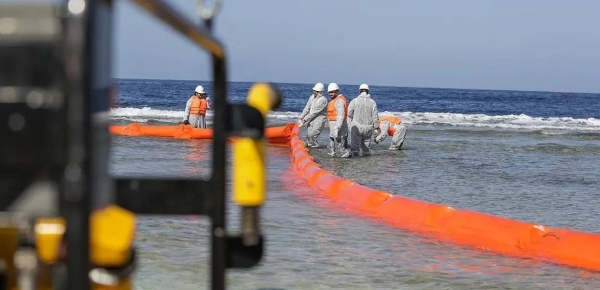Saudi Arabia recently conducted a two-day training drill called “Response 14” along the coastlines of the Tabuk Region. The exercise focused on responding to marine oil spills and other environmental hazards. This initiative was supervised by the National Center for Environmental Compliance and was attended by 39 public and private entities. The drill is part of an ongoing series aimed at enhancing the country’s readiness for environmental emergencies.
According to Saad Al-Matrafi, spokesperson for the center, the program has significantly improved participants’ preparedness with each exercise. He emphasized that the enhancement goes beyond just technology – it involves mobilizing talent from various sectors such as environmental, security, and industrial, as well as major national companies. Cutting-edge technology was utilized in the multi-phased exercise, with the first stage involving satellites and advanced simulations. The following stages included a simulated pollution scenario in territorial waters affecting both coasts and marine life. The final phase evaluated the ability of participating entities to contain the simulated spill quickly and minimize environmental and economic damage.
Al-Matrafi highlighted that the exercise assessed the control of the situation, waste disposal management, and effective rehabilitation and damage assessment. The national plan successfully contained a simulated 75,000-barrel spill within an impressive 50 minutes through the deployment of naval units, mission aircraft, and equipment like skimmers for efficient oil collection. These drills demonstrate Saudi Arabia’s commitment to protecting its marine environment and waterways from potential environmental threats, ensuring their long-term sustainability.
The exercise in the Tabuk Region is part of a broader effort by Saudi Arabia to safeguard its vital coastlines and prepare for environmental emergencies effectively. The country aims to strengthen national readiness through collaboration between public and private entities. The training drill showcased the country’s ability to utilize cutting-edge technology and mobilize talent from different sectors to respond to environmental hazards promptly.
The National Center for Environmental Compliance emphasized the importance of these exercises in assessing and improving the country’s preparedness for marine oil spills and other environmental emergencies. The drills have demonstrated significant improvements in participants’ readiness and the country’s ability to respond to such incidents effectively. By simulating pollution scenarios and evaluating response strategies, Saudi Arabia is enhancing its capacity to protect its marine environment and mitigate environmental damage.
The success of the “Response 14” training drill underscores Saudi Arabia’s dedication to protecting its marine environment and ensuring the long-term sustainability of its vital coastlines. The country’s commitment to safeguarding its waterways from potential environmental threats is evident in the proactive approach taken to conduct such exercises. By continually enhancing readiness and response capabilities, Saudi Arabia is positioning itself as a leader in environmental protection and emergency preparedness in the region. The collaboration between public and private entities in these drills reflects a collective effort to safeguard the country’s natural resources and preserve its marine ecosystems for future generations.











